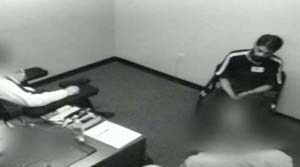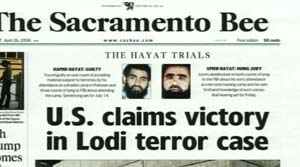


The investigation and prosecution of Hamid Hayat and his father Umer, residents of Lodi, California, have been touted as a major victory in the fight against homegrown terrorism.
Soon after 9/11, an FBI informant made an alarming claim: Osama bin
Laden's deputy, Ayman al-Zawahiri, had visited the town of Lodi, Calif.
in the late 1990s and attended a mosque there. Moreover, two Pakistani
imams preaching at the mosque came from a conservative Islamic school,
or madrassa, linked to the former Taliban regime in Afghanistan.
According to McGregor Scott, the U.S. attorney who led the
federal anti-terror investigation, this was "an attempt by a group of
radical Islamic religious figures to come to this country and …
establish a madrassa to serve as a recruiting ground."
However, a deeper look at the evidence creates uncertainty about what
kind of threat actually did exist in Lodi and provides a case study of
America's response to the threat of domestic terrorism. In "The Enemy
Within, " FRONTLINE and New York Times reporter Lowell Bergman
examines the Lodi case and interviews FBI and Homeland
Security officials to assess U.S. anti-terror efforts
The Lodi investigation drew the attention of
senior U.S. officials. "A network of Islamic extremists in Lodi,"
Director of National Intelligence John Negroponte told Congress in
February 2006, "maintained connections with Pakistani militant groups,
recruited U.S. citizens, … [and] allegedly raised funds for
international jihadist groups."
But when Bergman interviews one of the defendants, Umer Hayat, an ice
cream truck driver in Lodi, about the terror investigation, the story
seems less clear. "I just make [up] a story, that's all," says
Hayat, "because they would not believe me when I was telling the
truth." At the trials of Hayat and his son, Hamid, the FBI showed a
videotape in which the Hayats confessed to attending a terrorist
training camp in Pakistan, but questions remain. After arriving at the
bureau's Sacramento office voluntarily, the Hayats were interrogated
nonstop for 15 hours without a lawyer present. Separated, they gave
different accounts of the camp they had visited, and the FBI did not
conduct a follow-up investigation in Pakistan. "You can hear the agents
literally dictate to [Hayat] what it is that they thought he was
involved in," says James Wedick, a retired 35-year veteran of the
FBI, who reviewed the videos for the defense. "And then he mimics back
to them what he thinks that they want to hear."
Editor's Note: Read the FBI's response to criticism about how the case was handled.
According to Wedick, from the beginning, the case was based on bad
intelligence. He tells FRONTLINE that the idea that Zawahiri had visited
Lodi was "totally ludicrous," and prosecutors now admit that the
informant was mistaken. The trial ended April 25 with the conviction of
Hamid Hayat for attending a training camp and lying to
the FBI. In late October, attorneys for Hayat filed a motion for a new trial based on reports of "extensive misconduct" by the jury foreman. A hearing is scheduled for mid-January 2007.
Update, Sept. 10, 2007: On May 17, 2007, a federal judge denied Hayat's motion for a new trial, and on Sept. 10, the same judge sentenced Hayat to 24 years in prison. His attorneys intend to appeal his conviction.
After the jury deadlocked over charges against Hamid's father, Umer Hayat, he pled guilty to an unrelated charge of making a false claim on a customs form and was released.
Critics of the U.S. war on terror, both in and out of government,
fear that cases like Lodi demonstrate that the Bush administration, the
Justice Department and the FBI have exaggerated the terrorist threat
inside America. "Terrorism itself can be a rallying cry
for political purposes," says John Brennan, founder of the
National Counterterrorism Center and 23-year veteran of the CIA. "There
is a legitimate concern about terrorism. However, you don't want to
overhype it, and I think there has been some of that over the past
couple of years."